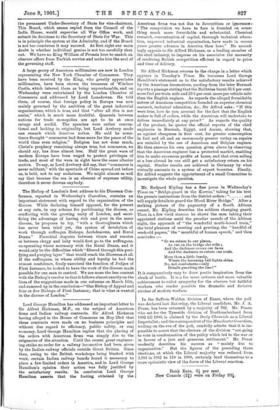The Bishop of London's first address to his Diocesan Con-
ference, reported in Wednesday's Guardian, contains an important statement with regard to the organisation of the diocese. While declaring himself opposed, for the present at any rate, to any scheme for partitioning the diocese, as conflicting with the growing unity of London, and sacri- ficing the advantage of having rich and poor in the same diocese, he proposes to try, "with a thoroughness which has never been tried yet, the system of devolution of work through suffragan Bishops, Archdeacons, and Rural Deans." Parochial disputes between vicars and curates or between clergy and laity would first go to the suffragans, co-operating where necessary with the Rural Deans, and it would only be the difficulties which" filtered through this puri- fying and purging layer" that would reach the Diocesan at all. If the suffragans, in whose ability and loyalty he bad the utmost confidence, freely exercised the function of Judges of First Instance, he looked to have the work of the diocese made possible for one man to controL We are none the less content with the Bishop's resolve in that it follows almost exactly on the lines of the suggestions made in our columns on March 16th, and summed up in the conclusion—" One Bishop of Appeal and four or five Bishops of First Instance; that is what is wanted in the diocese of London."






































 Previous page
Previous page